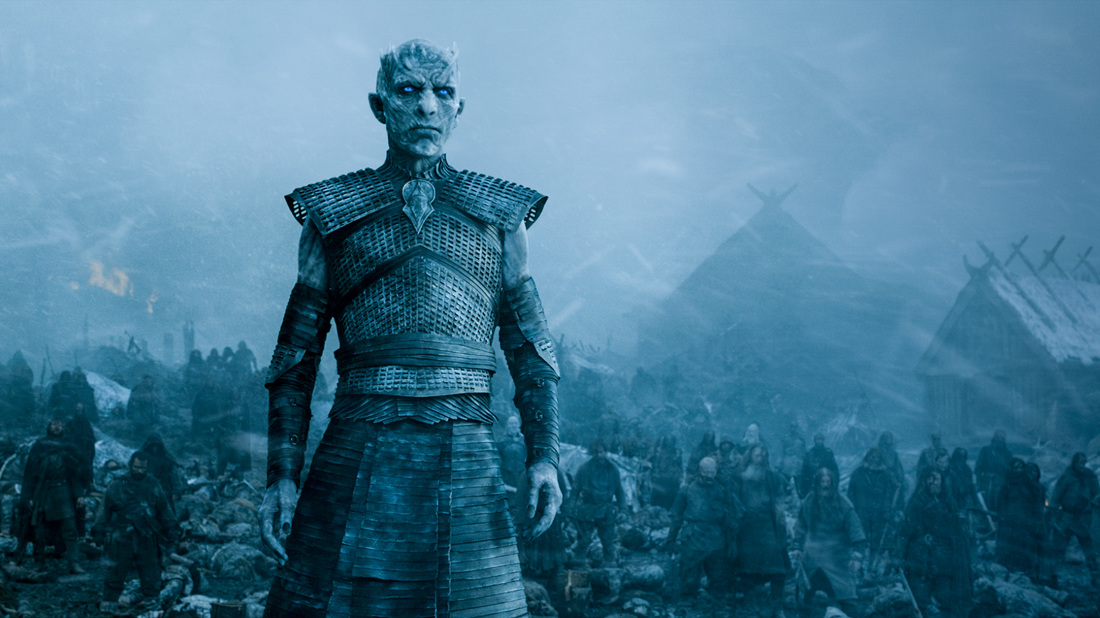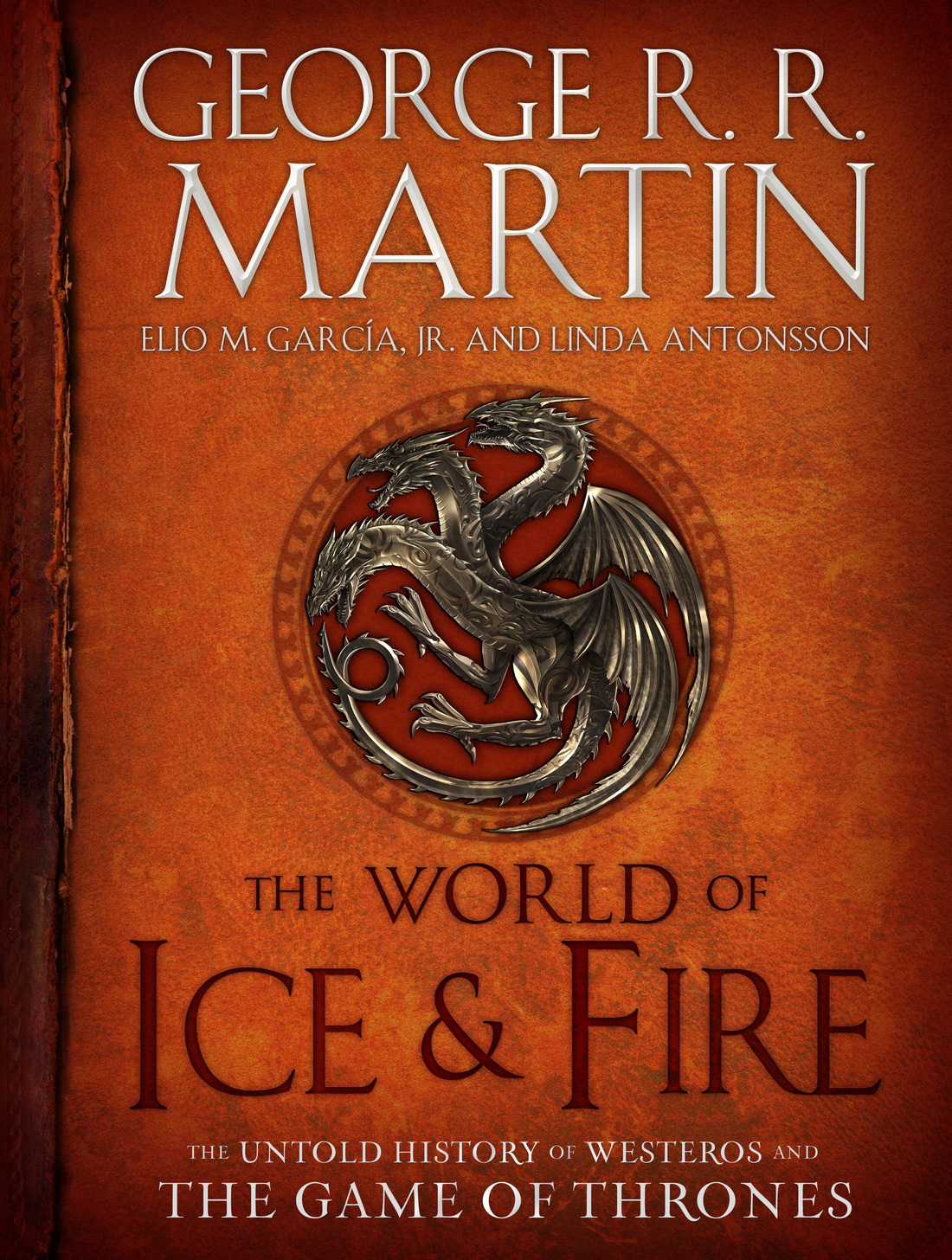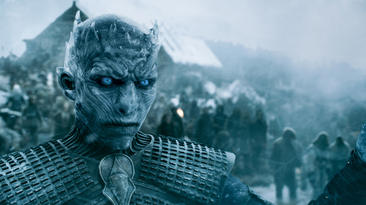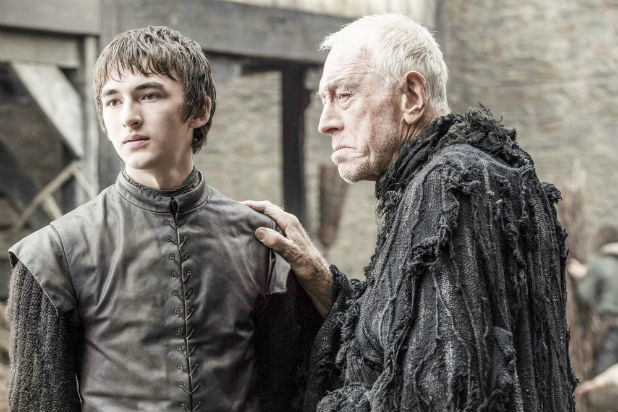By Logan Drake
One of the most brilliant things about Game of Thrones (the HBO series and the book series, A Song of Ice and Fire) is that we, the watchers and/or readers, still don't know, with any real confidence, what the story of Game of Thrones is.
Is it the story about the fall and possible rise of the Starks? Is it the story of the return of a once great and powerful family (the Targaryens)? Is it a story centered on the Lannisters? Is it the story of a continent thrown into violence and chaos by the death of a king? Does Dorne somehow play the central role?
Game of Thrones certainly contains these stories, but it seems clear to me, based on the evidence so far provided in both the books and the series, that when everything is said and done, answering the question "what is Game of Thrones about?" with anything about a specific family or talk of who could end up on some pointy throne will feel like an incredible simplification, if not outright inaccurate.
While I don't yet have an argument for exactly what the Game of Thrones endgame is going to look like, two points make it seem that it's definitely going to be something much larger than any single character, any one family, or even who ends up "on top" by claiming the Iron Throne.
Is it the story about the fall and possible rise of the Starks? Is it the story of the return of a once great and powerful family (the Targaryens)? Is it a story centered on the Lannisters? Is it the story of a continent thrown into violence and chaos by the death of a king? Does Dorne somehow play the central role?
Game of Thrones certainly contains these stories, but it seems clear to me, based on the evidence so far provided in both the books and the series, that when everything is said and done, answering the question "what is Game of Thrones about?" with anything about a specific family or talk of who could end up on some pointy throne will feel like an incredible simplification, if not outright inaccurate.
While I don't yet have an argument for exactly what the Game of Thrones endgame is going to look like, two points make it seem that it's definitely going to be something much larger than any single character, any one family, or even who ends up "on top" by claiming the Iron Throne.
1. The books talk incessantly about the past.
SPOILER WARNING: This section contains spoilers for all 5 books and the show through season 6 episode 5, "The Door."
|
Much more so than we've seen in the show, the books are absolutely obsessed with the past. And with the six season, we are seeing the past play
We get long, often seemingly random tangents going to incredible lengths to detail the history of the world of Game of Thrones. Bran the Builder, the Doom of Valyria, the Children of the Forest, the Andals, the First Men, Robert's Rebellion, and much more all receive numerous, detailed passages in the books. Hell, there's even an entire novel set a century before the events of the series, and a massive companion book, "The World of Ice and Fire," that is a straight up history book for this fictional world. |
You could argue that these are simply "world building" efforts, that George RR Martin and his legion of nerds just happen to love super detailed and complicated fictional worlds. While that fact may very well be true, there is substantial evidence that history is somehow going to play a massive role in the story's endgame:
- The show is starting to deal with the past too. Through Bran's wacky adventures with the Three Eyed Raven, we are starting to see the past in a way more vivid than even the books have thus far offered. The fact that the show is now making an active point of diving into the past is a good sign that the past plays a more important role than simply showing us that Ned maybe embellished some of his achievements.
-
The whole Hodor thing. It would be nonsensical to go to all the effort of introducing the Three Eyed Raven, the magical see-into-the-past-tree (yes, I know it's called a weirwood), and all of Bran's greenseer visions (or maybe more than visions?) of the past all just to make Hodor's death extra tragic. Obviously Bran essentially destroying young Willis' life serves not only to make us cry when Hodor's history is revealed, but also to show us the true extent of Bran's powers, and to provide yet another hint that the past is important.
-
Tyrion loves history, Joffery hated it. This is more of an interesting tidbit than a real piece of evidence, but still. Throughout the story we have seen many smart, knowledgeable, and "good" (in the way anyone in Game of Thrones is good) characters know a lot of history. Tyrion, everyone's favorite imp, has expansive knowledge of both history and myth (or what many assume to be myth). Sam, everyone's favorite vomiting sailor, also has extensive historical knowledge. Meanwhile, Joffery, everyone's least favorite piss-ant, makes a point of chopping up his uncle's one-of-a-kind history book wedding gift thing. If there's a more clear statement that the past is important, I don't know what it could be.
2. Myths, and magic, are returning.
SPOILER WARNING: This section contains spoilers for all 5 books and the show through season 6 episode 5, "The Door."
|
The story of Game of Thrones, much like many of its characters, is playing the long game. We don't see all the cards the story has to offer in the first book or the first season.
If there's one trend that defines the series (other than "living characters decrease as time elapses"), it's ever increasing levels of magic. |
We saw very little in the way of the magical arts in the first season and first book, until the very end when Dany's dragons were born. We heard about a lot of things, sure, but they were mostly myths, stories of long forgotten magics that may or may not be completely fictional. By now we've seen shadow demon babies, numerous characters brought back to life in various fashions, an army of ice zombies, a weird, knowledgeable man who lives in a tree in a cave, a species of small, child-like little things with exploding pine cones (or something?), a group of ice people made by the child-like things, and more. (When you list it all out you realize how crazy this show really is.)
The trend is in the direction of more magic. The things once thought of as pure myth are turning out to be terrifyingly real. This isn't mere luck or happenstance, this is a deliberate trend, a slow burn. It is the show (and the books) ever so slowly revealing its cards.
The trend is in the direction of more magic. The things once thought of as pure myth are turning out to be terrifyingly real. This isn't mere luck or happenstance, this is a deliberate trend, a slow burn. It is the show (and the books) ever so slowly revealing its cards.
Clearly, the past and the Northern characters are important.
|
All of this is to say, simply, that trying to describe Game of Thrones in terms of what the first season or the first book portrays is misguided. This series is a slow and deliberate one, one built on subverting audience expectations and genre tropes. And one of the many ways it does this is by not revealing the final, true, ultimate conflict until close to the very end.
|
We've been lead to believe that the end game is "who gets the Iron Throne," but this was a slight of hand. Game of Thrones is about much more than that, and who ends up on the throne is only a small cog in a huge machine, a machine that we are only starting to see the edges of.
Hardhome was the first time we saw the world of Game of Thrones face a real, existential threat. Sure, something about Cerci having power feels weird, and it might be cool if Dany and her dragons killed a bunch of people. Hell, seeing Sansa take the Iron Throne would be amazing! But none of these conflicts have the potential to kill everyone on the continent, and presumably bring about an eternal winter akin to what we see in The Lion, the Witch, and the Wardrobe.
But what we saw at Hardhome could easily do exactly that, and no one beyond the Wall knows about it, or would even believe it if they were told.
Clearly, Game of Thrones' endgame is going to have something to do with what's going on north of the Wall, with Jon and Bran and White Walkers and wights and giants and magic. And where did we first hear about White Walkers and wights and giants and magic? In summaries of the story's past.
Hardhome was the first time we saw the world of Game of Thrones face a real, existential threat. Sure, something about Cerci having power feels weird, and it might be cool if Dany and her dragons killed a bunch of people. Hell, seeing Sansa take the Iron Throne would be amazing! But none of these conflicts have the potential to kill everyone on the continent, and presumably bring about an eternal winter akin to what we see in The Lion, the Witch, and the Wardrobe.
But what we saw at Hardhome could easily do exactly that, and no one beyond the Wall knows about it, or would even believe it if they were told.
Clearly, Game of Thrones' endgame is going to have something to do with what's going on north of the Wall, with Jon and Bran and White Walkers and wights and giants and magic. And where did we first hear about White Walkers and wights and giants and magic? In summaries of the story's past.
Many are making arguments that miss the point.
|
|
Far too often though, you see or hear complaints about the direction of the show. They complain about the use of "flashbacks" and a weak form of storytelling, a cheap and easy way of revealing mostly unnecessary information. They find Bran's story line boring, they hate the weird demon smoke baby thing, they think the White Walkers are the show jumping the shark. And it's fine if that's not your thing, but that is, at bottom, what Game of Thrones is, and we're just starting to see the full extent of that.
|
The show starting to focus more on Bran, the past, and what's going on North of the Wall isn't a sign of the show "losing focus" or "jumping the shark," it's a sign that the end is in sight, and that the final, true conflict of the entire narrative is becoming clear. These scenes aren't a distraction from the politics of King's Landing. These scenes show us that the politics of King's Landing have been a distraction all along.
I fully expect to be surprised by the specifics of the final conflict, by the way it plays out. At the same time, however, I am completely confident that both the past and the crazy magic North of the Wall (and with Dany and her dragons) will play an integral part.
I fully expect to be surprised by the specifics of the final conflict, by the way it plays out. At the same time, however, I am completely confident that both the past and the crazy magic North of the Wall (and with Dany and her dragons) will play an integral part.





 RSS Feed
RSS Feed
